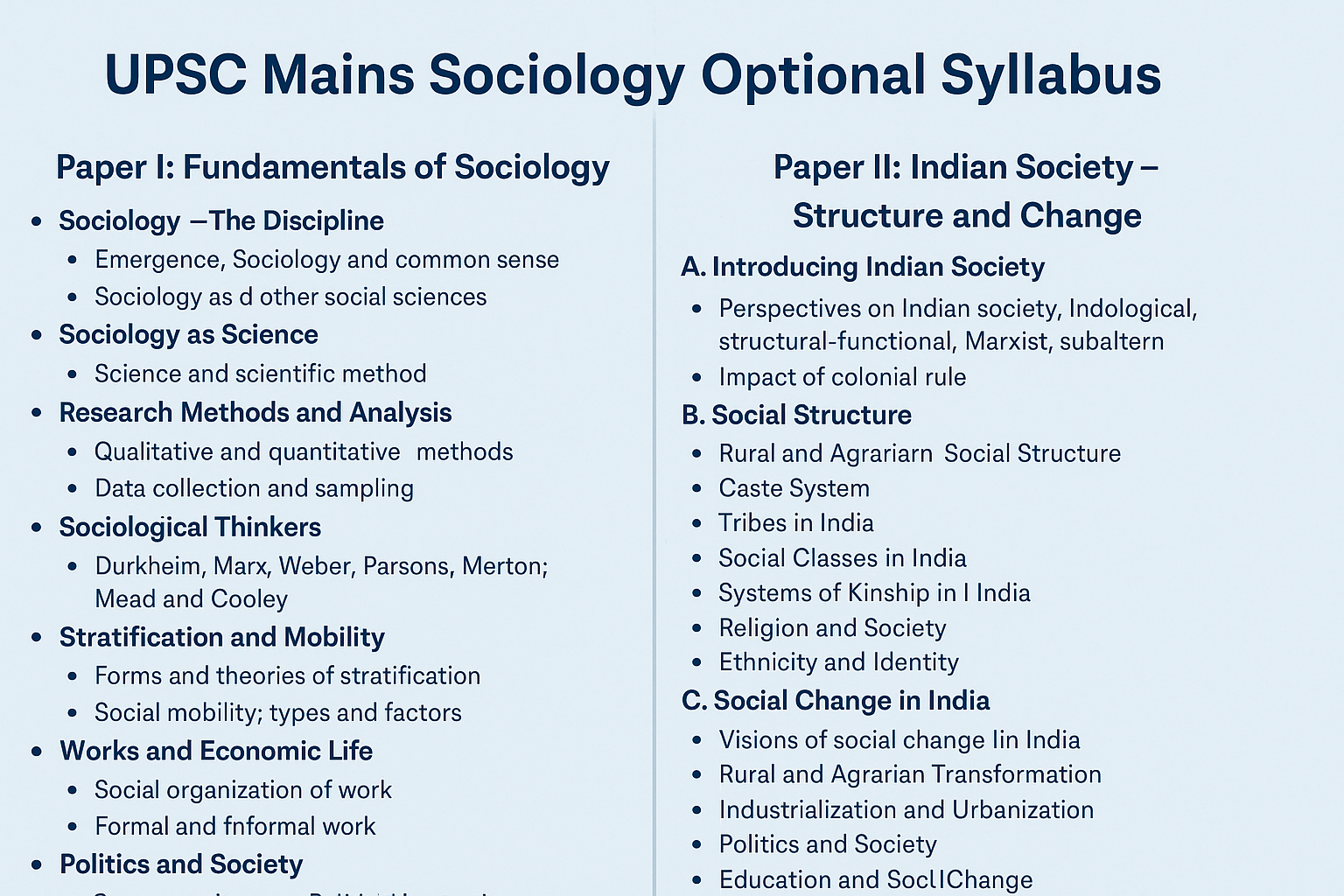Complete UPSC Mains Sociology Optional Syllabus – Paper I & II (Detailed Breakdown)
Sociology is a popular optional subject in the UPSC Civil Services Mains Exam due to its relevance to Indian society, general studies papers, and essay writing. The syllabus is structured into two papers:
- Paper I – Fundamentals of Sociology (Theoretical and Conceptual)
- Paper II – Indian Society: Structure, Change, and Development
Let’s break down each paper topic-by-topic in a detailed and descriptive manner.
Sociology Optional Paper I: Fundamentals of Sociology
Paper I covers the foundations of sociology, major theories, methods, thinkers, and social institutions. It focuses on conceptual clarity and sociological analysis.
Join WhatsApp community for Free Notifications, Updates, Study Material, Mock Tests, Internship Updates, and Current Affairs - CLICK HERE TO JOIN
1. Sociology – The Discipline
- Emergence of sociology: Historical background and intellectual forces.
- Sociology as a science: Positivism and critique.
- Sociology and common sense.
- Relationship with other social sciences: History, Economics, Political Science, Anthropology, Psychology.
2. Sociology as Science
- Science, scientific method, and critique.
- Major research techniques: Participant observation, survey, questionnaire, interview, case study.
- Positivism and its critique.
- Objectivity and value neutrality.
- Hypothesis, reliability, and validity.
3. Research Methods and Analysis
- Qualitative and quantitative methods.
- Data collection techniques: Primary vs. secondary data.
- Sampling design and types.
- Limitations of social research.
4. Sociological Thinkers
- Emile Durkheim: Division of labour, suicide, religion.
- Karl Marx: Historical materialism, class struggle, alienation.
- Max Weber: Social action, authority, bureaucracy, Protestant Ethic thesis.
- Talcott Parsons: Social system, AGIL scheme.
- Robert K. Merton: Latent and manifest functions, anomie, reference group theory.
- Mead and Cooley: Self and identity, looking-glass self.
5. Stratification and Mobility
- Concepts: Social stratification, hierarchy, inequality.
- Forms of stratification: Caste, class, race, gender, ethnicity.
- Theories of social stratification: Functionalist, conflict, Weberian.
- Social mobility: Types and factors affecting it.
- Open and closed systems.
6. Works and Economic Life
- Social organization of work in different societies: Slave, feudal, industrial.
- Formal and informal organization of work.
- Labor and alienation.
- Work and economic structure in capitalist and socialist societies.
7. Politics and Society
- Sociological theories of power: Elite theory, pluralist theory.
- Political institutions: State, bureaucracy, civil society.
- Power, authority, and legitimacy.
- Political processes: Voting behavior, political participation, movements.
8. Religion and Society
- Sociological theories of religion: Durkheim, Weber, Marx.
- Role and functions of religion.
- Religion and social change.
- Religious pluralism, secularism, communalism.
9. Systems of Kinship
- Family, household, and marriage: Types and variations.
- Lineage and descent.
- Patriarchy and sexual division of labor.
- Contemporary trends: Alternative family forms, divorce, single parenting.
10. Social Change in Modern Society
- Theories of social change: Evolutionary, cyclical, conflict, functionalist.
- Development and dependency.
- Agents of social change: Education, media, technology.
- Globalization and social transformation.
Join WhatsApp community for Free Notifications, Updates, Study Material, Mock Tests, Internship Updates, and Current Affairs - CLICK HERE TO JOIN
Sociology Optional Paper II: Indian Society – Structure and Change
Paper II focuses on Indian society, covering its structural components, diversity, changes, challenges, and state interventions. It requires both factual knowledge and analytical depth.
A. Introducing Indian Society
- Perspectives on Indian society:
- Indological (G.S. Ghurye)
- Structural-functional (M.N. Srinivas)
- Marxist (A.R. Desai)
- Subaltern and feminist perspectives
- Impact of colonial rule on Indian society:
- Social reform movements
- Modern education
- Industrialization and urbanization
B. Social Structure
1. Rural and Agrarian Social Structure
- Land ownership and land reforms.
- Agrarian social structure – evolution and transformation.
- Caste and class in rural India.
2. Caste System
- Perspectives on caste: G.S. Ghurye, M.N. Srinivas, Louis Dumont, Andre Béteille.
- Features of caste in India.
- Caste in politics and politics of caste.
- Dominant caste, caste mobility, casteism.
3. Tribes in India
- Definitional problems.
- Tribal communities and regions.
- Integration and assimilation vs. autonomy.
- Tribal movements.
4. Social Classes in India
- Agrarian, industrial, and middle classes.
- Emergence and characteristics.
- Class in relation to caste.
5. Systems of Kinship in India
- Family and marriage patterns.
- Patriarchy and matriarchy.
- Regional variations in kinship systems.
- Changes in family and marriage: urbanization, migration, laws.
6. Religion and Society
- Religious communities in India.
- Religious pluralism and inter-faith dynamics.
- Secularism, communalism, and religious revivalism.
7. Ethnicity and Identity
- Concept of ethnicity.
- Regionalism, communalism, nationalism.
- Ethnic conflicts and state responses.
Join WhatsApp community for Free Notifications, Updates, Study Material, Mock Tests, Internship Updates, and Current Affairs - CLICK HERE TO JOIN
C. Social Change in India
1. Visions of Social Change in India
- Ideals of Gandhi, Nehru, Lohia, Ambedkar.
- Concepts of modernization and development.
2. Rural and Agrarian Transformation
- Green Revolution and its impact.
- Land reforms and rural development.
- Changing power structure in rural India.
3. Industrialization and Urbanization
- Growth of industries and changing labor relations.
- Urban problems: housing, slums, migration, pollution.
- Emergence of urban middle class and informal sector.
4. Politics and Society
- Political parties and voting behavior.
- Regionalism and decentralization (Panchayati Raj).
- Social movements: Dalit, tribal, environmental, feminist.
5. Education and Social Change
- Role of education in modernization.
- Inequality in educational access.
- Educational policies and reforms.
6. Science, Technology, and Social Change
- Technology and rural/urban transformation.
- Digital divide and knowledge society.
7. Population Dynamics
- Population policy and family planning.
- Demographic transition and aging.
- Migration – internal and international.
8. Challenges of Social Transformation
- Poverty, inequality, and unemployment.
- Communalism, regionalism, terrorism.
- Social violence: caste-based, gender-based, communal.
- Development-induced displacement and rehabilitation.
Final Thoughts & Strategy
Why Sociology is a good optional:
- Overlaps with General Studies (GS1: Indian Society, GS2: Social Justice, GS3: Internal Security, GS4: Ethics).
- Useful for Essay and Interview.
- Requires conceptual clarity, not rote memorization.
Tips to Prepare:
- Read NCERTs and standard books (e.g., Haralambos, Ritzer, Indian Sociologists).
- Make crisp notes with thinkers and real-life examples.
- Practice answer writing with sociological terms and thinkers' names.


 firstiasofficial@gmail.com
firstiasofficial@gmail.com
Leave a Comment